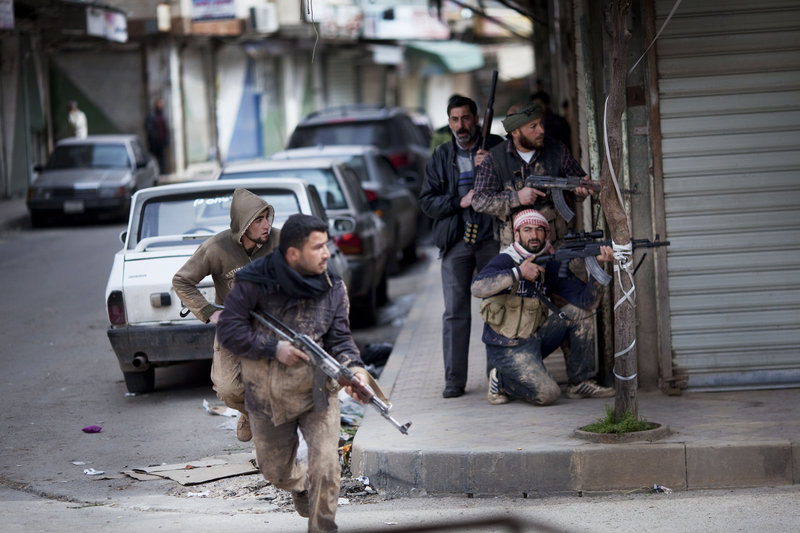BEIRUT — The Syrian army has recaptured most of the northern rebel stronghold of Idlib near the Turkish border, pushing hundreds of military defectors out of a major base they had held for months even as pockets of resistance kept up their fight on Tuesday.
The three-day operation to capture the city followed closely after a similar offensive to dislodge the opposition from another key piece of territory it had controlled, the Baba Amr district in central Homs. The two victories gave President Bashar Assad’s regime unmistakable momentum as it tries to crush the armed opposition fighters.
A pledge Tuesday from Syria’s staunch ally Russia that Moscow will continue selling weapons to the regime was yet another boost. And a diplomatic bid by U.N. envoy Kofi Annan to broker a cease-fire and start negotiations failed over the weekend.
Still, international pressure is more intense than ever, with the U.S. considering military options. On Tuesday, the Arab League chief said the regime’s killing of civilians amounts to crimes against humanity and he called for an international inquiry.
Activists reported fresh violence in the central province of Hama near Homs, the suburbs of Damascus and elsewhere, killing dozens.
New York-based Human Rights Watch said troops have planted land mines near its borders with Turkey and Lebanon along routes used by people fleeing the violence and trying to reach safety in neighboring countries. HRW said its report was based on accounts from witnesses and Syrian deminers and that the land mines have already caused civilian casualties.
“Any use of anti-personnel land mines is unconscionable,” said Steve Goose of Human Rights Watch. “There is absolutely no justification for the use of these indiscriminate weapons by any country, anywhere, for any purpose.”
In November, a Syrian official and witnesses told The Associated Press that Syria planted land mines along parts of its border with Lebanon. The official claimed that the mines aimed to prevent arms smuggling.
HRW quoted a former Syrian army deminer as saying that in early February, he visited the border town of Hasanieih and found land mines planted “between the fruit trees three meters (yards) from the border in two parallel lines, each approximately 500 meters (yards) long.”
HRW also quoted a resident of the border town of Kherbet al-Joz as saying that for 20 days, until March 1, he saw some 50 soldiers accompanied by two large military vehicles putting land mines starting from Kherbet Al-Joz toward two other villages. Both Kherbet al-Joz and Hasanieih border Turkey.
Fresh from a monthlong campaign that drove rebels out of Baba Amr in the city of Homs, Assad’s forces launched a siege on the Idlib three days ago. The city largely had been under control of hundreds of fighters for the rebel Free Syrian Army.
The pro-government Al-Watan daily and the Britain-based Syrian Observatory for Human Rights said government troops were in control of Idlib on Tuesday. The Observatory said the army was still facing some resistance pockets in three Idlib areas, including the central neighborhoods of Dubait and Bustan Ghanoum.
Idlib, a predominantly Sunni city of some 150,000 people located about 100 miles north of Homs, was among the first to fall into the hands of army defectors last summer.
Send questions/comments to the editors.



Success. Please wait for the page to reload. If the page does not reload within 5 seconds, please refresh the page.
Enter your email and password to access comments.
Hi, to comment on stories you must . This profile is in addition to your subscription and website login.
Already have a commenting profile? .
Invalid username/password.
Please check your email to confirm and complete your registration.
Only subscribers are eligible to post comments. Please subscribe or login first for digital access. Here’s why.
Use the form below to reset your password. When you've submitted your account email, we will send an email with a reset code.